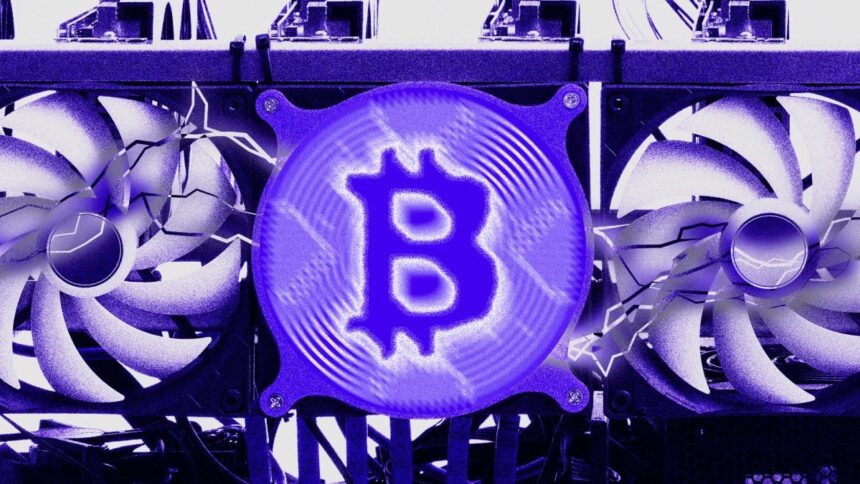TeraWulf Bitcoin miner experienced a significant downturn in its Bitcoin production during the second quarter of 2024, with a reported 21% year-over-year decline. Despite this setback, the company managed to exceed revenue expectations, highlighting a mixed quarter for the company as it navigates a challenging market. TeraWulf is now setting its sights on artificial intelligence (AI) and high-performance computing (HPC) as strategic growth areas for the future.
21% Drop in Bitcoin Production
TeraWulf Bitcoin miner reported a steep decline in its Bitcoin production during Q2 2024, with the company mining only 699 Bitcoins, down 21% from the same period last year. This drop is attributed primarily to an increase in network difficulty and the impact of Bitcoin’s April 2024 halving event. According to TeraWulf’s August 2 earnings report, these factors have significantly squeezed mining profitability.
The halving event, which occurs approximately every four years, reduces the reward for mining a Bitcoin block by half. This naturally increases the cost of mining each Bitcoin, an impact clearly felt by TeraWulf. In Q2 2023, TeraWulf spent $6,688 to mine a single Bitcoin. Fast forward to Q2 2024, and this figure ballooned to $22,954 per Bitcoin—a staggering 243% increase.

“Our Q2 results reflect the difficult operating environment caused by the Bitcoin halving and rising network difficulty,” said Kerri Langlais, TeraWulf’s Chief Strategy Officer. “We are adapting by seeking new avenues for growth, particularly in the AI and HPC sectors.”
Revenue Surpasses Expectations Despite Losses
Despite the decline in Bitcoin production, TeraWulf’s Q2 revenue of $35.6 million managed to slightly exceed analyst expectations of $35.4 million. This revenue beat provides some reassurance to investors in an otherwise challenging quarter. However, the company posted a quarterly loss of $0.03 per share, missing the estimated loss of $0.02 per share.
The financial strain on TeraWulf is evident when examining the rising costs associated with Bitcoin mining. The 243% increase in mining costs year-over-year has directly impacted the company’s bottom line, pushing it to explore new revenue streams. The steep operational costs highlight the difficulties that many Bitcoin miners face in the current market, especially smaller or less efficient operations.
Focus Shifts to AI and HPC Expansion
Facing increasing costs and a more challenging environment for Bitcoin mining, TeraWulf is turning its attention to other opportunities in the technology sector, particularly AI and HPC. The company has already begun construction on a new facility at its Lake Mariner site, which is expected to add 50 megawatts (MW) of infrastructure capacity when it becomes operational in the first quarter of 2025.
In addition to expanding its physical infrastructure, TeraWulf Bitcoin miner is investing in AI capabilities. On July 9, the company announced plans to allocate an initial 2 MW block to its AI and HPC operations at Lake Mariner. As part of this move, TeraWulf has purchased a 128-GPU cluster from NVIDIA, a leading name in the AI hardware market.

“Expanding into AI and HPC is a strategic move to diversify our revenue streams and leverage our existing infrastructure,” Langlais explained. “This expansion positions us to take advantage of the growing demand for AI-driven solutions.”
This shift towards AI and HPC comes at a time when the broader technology industry is increasingly recognizing the potential of these fields. By entering this space, TeraWulf aims to reduce its reliance on Bitcoin mining, which has become less predictable and more costly.
Major Takeaway on TeraWulf Bitcoin Miner Decline
TeraWulf Bitcoin miner second-quarter performance presents a mixed bag for the company and its investors. While the 21% drop in Bitcoin production and rising costs are concerning, the company’s ability to exceed revenue expectations offers a silver lining. More importantly, TeraWulf’s proactive move towards AI and HPC signals its intent to adapt to the changing landscape of the technology sector. As the company continues to expand its capabilities in these areas, it could position itself more favorably in the coming years, potentially mitigating the challenges posed by the volatile Bitcoin mining market. Keep following TheBITJournal for latest updates on TeraWulf Bitcoin miner.





























